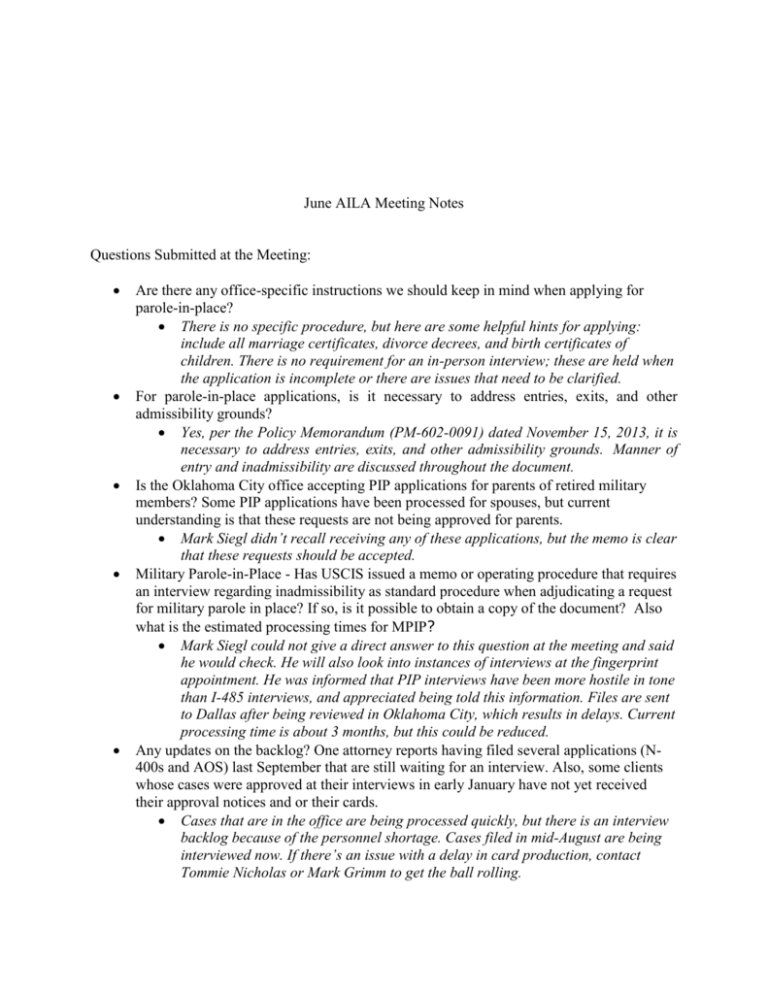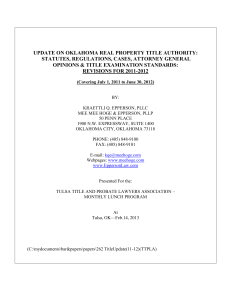Oklahoma USCIS June 2014 Questions and Answers
advertisement

June AILA Meeting Notes Questions Submitted at the Meeting: Are there any office-specific instructions we should keep in mind when applying for parole-in-place? There is no specific procedure, but here are some helpful hints for applying: include all marriage certificates, divorce decrees, and birth certificates of children. There is no requirement for an in-person interview; these are held when the application is incomplete or there are issues that need to be clarified. For parole-in-place applications, is it necessary to address entries, exits, and other admissibility grounds? Yes, per the Policy Memorandum (PM-602-0091) dated November 15, 2013, it is necessary to address entries, exits, and other admissibility grounds. Manner of entry and inadmissibility are discussed throughout the document. Is the Oklahoma City office accepting PIP applications for parents of retired military members? Some PIP applications have been processed for spouses, but current understanding is that these requests are not being approved for parents. Mark Siegl didn’t recall receiving any of these applications, but the memo is clear that these requests should be accepted. Military Parole-in-Place - Has USCIS issued a memo or operating procedure that requires an interview regarding inadmissibility as standard procedure when adjudicating a request for military parole in place? If so, is it possible to obtain a copy of the document? Also what is the estimated processing times for MPIP? Mark Siegl could not give a direct answer to this question at the meeting and said he would check. He will also look into instances of interviews at the fingerprint appointment. He was informed that PIP interviews have been more hostile in tone than I-485 interviews, and appreciated being told this information. Files are sent to Dallas after being reviewed in Oklahoma City, which results in delays. Current processing time is about 3 months, but this could be reduced. Any updates on the backlog? One attorney reports having filed several applications (N400s and AOS) last September that are still waiting for an interview. Also, some clients whose cases were approved at their interviews in early January have not yet received their approval notices and or their cards. Cases that are in the office are being processed quickly, but there is an interview backlog because of the personnel shortage. Cases filed in mid-August are being interviewed now. If there’s an issue with a delay in card production, contact Tommie Nicholas or Mark Grimm to get the ball rolling. What is the procedure for entering the building for minor DACA/U-visa applicants in order to attend biometrics appointments when they are unable to obtain a passport due to circumstances outside their control: e.g applicants who have one parent unwilling to sign for them to obtain a passport, or where the State of Oklahoma has stripped the parental rights of one or more parents but the consulate of the respective country will not acknowledge a US court order. There is a distinction between requirements for entering the building v. biometrics. Minors should be able to enter the building without an ID, but they must establish identity for fingerprints. School IDs are fine for DACA minors, but non-minors should have government-issued ID. Minors can also use secondary forms of ID, such as a letter from a school on school letterhead, with a photo of the child with the school seal over the photo. If there is a question about the validity of ID for ASC purposes, the officer can call ASC from the security checkpoint and check if the provided form will be accepted. Is there a processing time frame for I-212s filed directly with the Oklahoma City office? General time frame is 2 months. Mark Siegl has asked the SISOs to complete pending cases as soon as possible. Oklahoma City Field Office Information: Staffing: A new ISO II has been hired; she is coming from ICE and will need training. She is starting the 6-week academy and should finish the end of July; she will gradually start doing interviews in August. On June 30th, there will be a new records supervisor (ISO I position) who is also coming from ICE and will need training. There are three officer vacancies in the OKC Field Office, but they are now in the final stages of selection for these positions. The new hires may need additional training. Things are better at the office than they have been, but with the additional work (including cases at Fort Sill, the MAVNI program, etc.) the workload has increased significantly. Improvements should be seen over the next 2-3 months.








